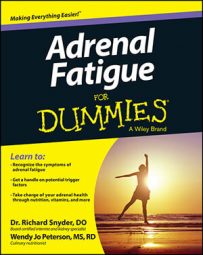An important aspect of the treating adrenal fatigue is combating inflammation. To do so, everyone should take a strong antioxidant daily. If you eat a healthy diet, do you really need to take an antioxidant? Probably.
The food you're consuming may not be as nutritious as you think. The soil where many vegetables grow is nutrient-depleted. Add to this the use of genetically modified organisms (GMOs) and preservatives and the toxins in some foods, and you're likely not providing your body with all the nutrition (and antioxidants) that you think that you are.
If you live in a bubble, you're not subject to any stress, you haven't been diagnosed with any chronic medical condition, you're getting 7 hours of quality sleep each night, and you eat nothing artificial or processed, then you don't need to add a daily antioxidant to your regimen. Unfortunately, no one meets those criteria.
You're likely to underestimate the degree of daily stresses and toxins that your body is exposed to and has to deal with — acidity, oxidative stress, and free-radical formation. Your body needs antioxidant support to deal with these daily stresses.
Carotenoids
When you walked through the farmers’ market or the produce department at the supermarket, you likely noticed the vibrant colors of many of the vegetables — red, yellow, and green bell peppers; orange carrots; yellow squash. The colors come from carotenoids, the pigments found in many vegetables.
Carotenoids, which include alpha-carotene, beta-carotene, lutein, astaxanthin, and zeaxanthin, have many beneficial properties. The carotenoids are potent antioxidants, and they inhibit certain pathways of inflammation, including the cyclooxygenase pathway.
In the body, some of the highest levels from this group of antioxidants are found in the adrenal glands. Because your body is unable to produce carotenoids, you need to either consume them in the diet or obtain them from supplements. This class of antioxidants is great for anyone with adrenal fatigue.
Foods high in carotenoids include pigmented fruits and vegetables, including berries, peppers, and green leafy vegetables. If you're able to get three to four servings of fruits and vegetables a day, you're likely getting an adequate amount of carotenoids. In the setting of adrenal fatigue, supplement with at least 5 milligrams of astaxanthin, 2 milligrams of zeaxanthin, and 5 milligrams of lutein.
Green tea
Green tea is an antioxidant with many health benefits. Research demonstrates that green tea may be especially helpful for combating brain fog associated with adrenal fatigue. The main ingredient in green tea is (get ready for some chemistry) epigallocatechin gallate (EGCG).
An article from the journal Life Sciences in 2013 reviewed the anti-inflammatory properties of EGCG in rheumatoid arthritis (RA). This condition, which is strongly associated with inflammation, is a cause of increased adrenal stress and adrenal fatigue. The authors felt that not only was EGCG beneficial in decreasing inflammation associated with rheumatoid arthritis, but EGCG also had heart protective effects.
Green tea is such an excellent antioxidant that you should aim to consume it at least two to three times a day if you can. You can have an 8-ounce cup of green tea with each meal. The amount of caffeine in green tea is very small compared to other caffeinated beverages.
If you don't like the taste of the drink, another option is a green tea capsule, which you can take once daily in the morning.
Turmeric
Turmeric — it's not just for South Asian cooking anymore! Actually, turmeric is a powerful antioxidant that has been used for centuries for its ability to reduce inflammation and treat pain. It's well known in traditional Indian medicine, which is called Ayurveda.
The main ingredient in turmeric is curcumin, a substance with powerful anticancer properties and excellent heart benefits. Some laboratory research data strongly suggests that curcumin directly benefits the adrenal glands.
In a study appearing in Brain Research in 2005, animals were subjected to daily stress for a period of 3 weeks. Researchers found that the chronic stress increased the thickness of the adrenal glands. The animals also demonstrated increased cortisol levels. The authors found that giving the animals curcumin reversed these changes to the adrenal glands.
Because of its strong anti-inflammatory properties, turmeric may decrease the stress on the adrenal glands and subsequently decrease the cortisol production.
Here are two easy ways that you can add turmeric to your diet:
Sprinkle turmeric powder (a spice) on each meal. Turmeric is in all major grocery stores.
Take turmeric capsules. A typical starting dose is 400 to 500 milligrams a day, taken in the morning. You can buy the capsules at co-ops, at health food stores, or online.
Quercetin
Quercetin is an antioxidant that has strong anti-inflammatory properties. An article from the Journal of Research in Medical Sciences in 2012 demonstrated that quercetin was effective in decreasing C-reactive protein (CRP) and interleukin 6 (IL-6) in human subjects. High levels of CRP and IL-6 are suggestive of active inflammation. Quercetin is a strong antioxidant, and it counters the oxidative stress and cellular damage associated with chronic inflammation.
Quercetin can be a tremendous aid if you have any medical conditions affecting the lungs, including asthma, chronic obstructive pulmonary disease (COPD), cystic fibrosis, and bronchiectasis.
Quercetin is a plant pigment found in fruits (apples and berries), vegetables (broccoli and green leafy vegetables), and grains. The trouble is that these foods don't contain much quercetin, so you're probably not getting enough of it in your diet. The answer, in this case, is supplementation.
Turmeric and quercetin are called flavonoids. Other flavonoids include green tea extract, grape seed extract, pine bark extract, and citrus bioflavonoids. All of them have excellent antioxidant effects, so you may consider a supplement complex that contains many of them.
You can find many different formulations of bioflavonoid complexes, and each formulation has different amounts of each component. Speak with your healthcare provider to find out which formulation may be appropriate for you.

